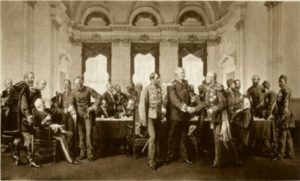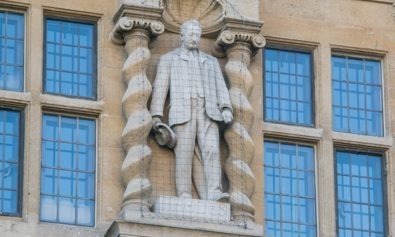The map on the wall in the Reich Chancellery in Berlin was five meters (16.4 feet) tall. It showed Africa with rivers, lakes, a few place names and many white spots. When the Berlin Conference came to an end on February 26, 1885, after more than three months of deliberation, there were still large swathes of Africa on which no European had ever set foot.
Representatives of 13 European states, the United States of America and the Ottoman Empire converged on Berlin at the invitation of German Chancellor Otto von Bismarck to divide up Africa among themselves “in accordance with international law.” Africans were not invited to the meeting.
The Berlin Conference led to a period of heightened colonial activity by the European powers. With the exception of Ethiopia and Liberia, all the states that make up present day Africa were parceled out among the colonial powers within a few years after the meeting. Lines of longitude and latitude, rivers and mountain ranges were pressed into service as borders separating the colonies. Or one simply placed a ruler on the map and drew a straight line. Many historians, such as Olyaemi Akinwumi from Nasarawa State University in Nigeria, see the conference as the crucible for future inner African conflicts.
“In African Studies, many of us believe that the foundation for present day crises in Africa was actually laid by the 1884/85 Berlin Conference. The partition was done without any consideration for the history of the society,” Akinwumi told DW.
New borders were drawn through the territories of every tenth ethnic group. Trade routes were cut, because commerce with people outside one’s colony was forbidden. Studies have shown that societies through which new frontiers were driven would later be far more likely to suffer from civil war or poverty.
“The conference did irreparable damage to the continent. Some countries are still suffering from it to this day,” Akinwumi said.
In many countries, such as Cameroon, the Europeans rode roughshod over local communities and their needs, said Michael Pesek, a researcher in African colonial history at the University of Erfurt. But historians, he explained, were now less inclined than they were to regard the arbitrary redrawing of Africa’s borders as the root cause of conflicts in postcolonial Africa.
“People had learnt to live with borders that often only existed on paper. Borders are important when interpreting Africa’s geopolitical landscape, but for people on the ground they have little meaning.”
Read more at DW



